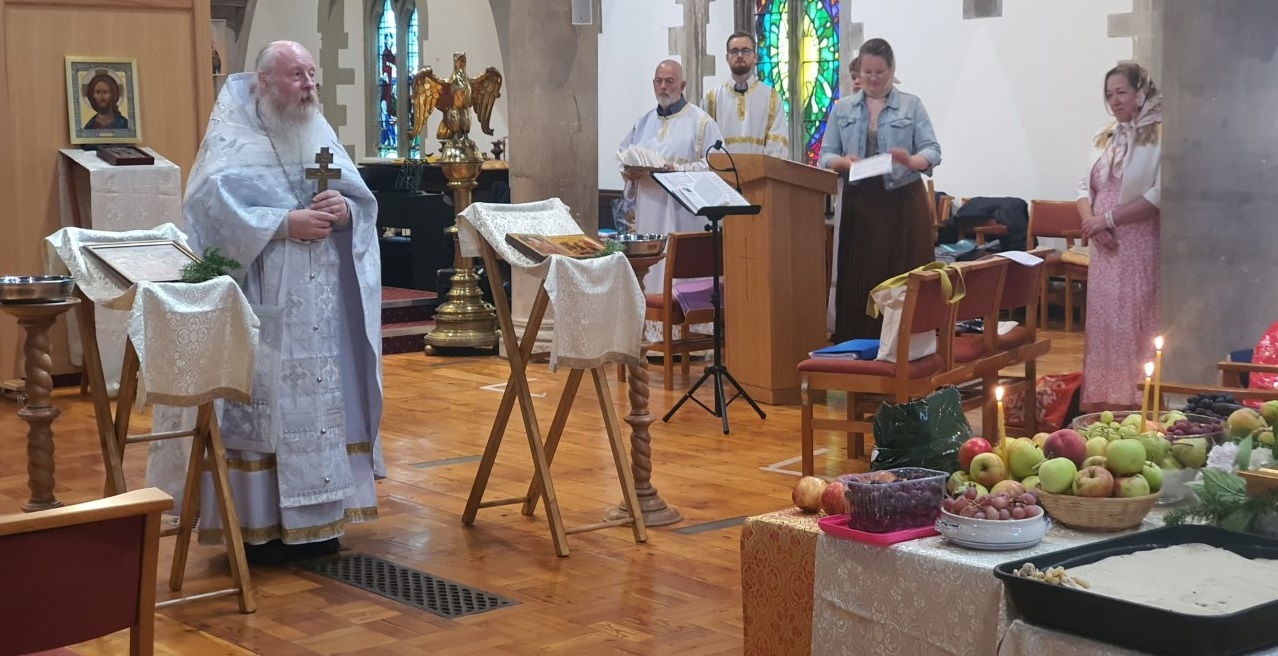Dear brothers and sisters,
Today, as we celebrated the after-feast of the Transfiguration (the Apple Saviour / Яблочный Спас), it was satisfying to pick apples only half an hour before today’s Liturgy, with the morning dew still glistening on the leaves and fruit on the trees in the chaplaincy garden.
As the Hours and Liturgy progressed baskets and bowls of fruit multiplied on the table placed behind the stand bearing the festal and Kazan icons.

At the end of every Liturgy, during the singing of Psalm 33, we hear the words “O taste and see, the Lord is good.” The folk names of these feasts of the All-Merciful Saviour and the Transfiguration bear witness to this as we bless the gifts of God’s creation and receive them as a blessing from Heaven.
On Medovy Spas (the Saviour of the Honey), the feast of the All-Merciful Saviour on 1/14 August, we blessed honey, and today – in lieu of the Transfiguration on 6/19 – we blessed grapes and orchard fruits.
As I commented at the end of Liturgy, this is not quaint folkloristic re-enactment, but a testimony to the consecration of time and space, the seasons, and the gifts of creation which are God’s gifts from these seasons.
Not only do we seek the spiritualisation of our lives as Christians, but we understand and fervently believe that the Grace of God sanctifies the work of His hands and sets it aside as His – even if that which is sanctified is taken back as a gift and blessing.
When we celebrated the All-Merciful Saviour, Father Deacon Mark reminded me of something I had forgotten.
Though we bless honey on 1/14 of August, during our sojourn at Nazareth House and the chaplaincy, we have also blessed the bee-hives around the feast of the Holy Great-Martyr Charalampos: 10/23 February.
Several winters ago, two of the colonies in the Nazareth House hives died during the cold weather, leaving few bees. After this tragedy (and ecologically the death of every bee colony is a tragedy), the blessing of the hives took on an extra poignancy. So, even the empty hives were blessed. What happened later surprised our Catholic friends. Two swarms of bees landed in the garden and colonised the empty hives.
Should we be surprised?
No! Blessings are real, with real effects. They are not quaint rituals which make our services and festivals more colourful. They change things, renewing them in a spiritual way.
The Turkish women of the region of Farasa, would take the emptied ash from the censer used by St Arsenios the Cappadocian, and were healed of illnesses when they mixed it with water and swallowed it. How and why should such a strange practice have any effect?
Watch the priest at Liturgy! How many times is the censer and its contents blessed? Again and again, and whenever we ‘bless’ something, it is the Lord who gives the Grace of blessing. This strange episode from the life of St Arsenios is testimony to the fact that, when blessed, the things of the material world are indelibly changed, and receive spiritual power and holiness.
And this goes for our apples and honey, for the ‘palms’ blessed at the Entrance of the Lord to Jerusalem, the sweet herbs and flowers blessed at the Dormition, the wheat, wine and oil blessed at every evening litia, and the eggs blessed at Pascha.

Please… take blessings seriously.
When you receive a blessing from a bishop or priest, receive it not from his hands, but from the hands of the Saviour.
When you take your honey, grapes or apples home, in August, equally treat them as something that you have received from Him.
When your house or your car is blessed, do not simply see this in protective terms or as ‘spiritual insurance’, but recognise that by this blessing they are dedicated to God, who gives them a new spiritual dimension and significance, setting them apart.
The heretical gnostics, and some heathen religions, see the material creation as an illusory prison, from which the spirit must be freed.
We, conversely, see the world and all that is in it as the created work of God, which He saw ‘and it was good’, At the Incarnation, God was clothed in humanity’s created flesh. At the Saviour’s baptism, creation was sanctified as the waters of Jordan received the God-Man. When the lance pierced the Saviour’s side during the crucifixion, the blood and water that flowed from Him sanctified the earth that received it.
The creation is a sign of God’s creative, expansive and limitless love, as is every season and the fruit that the harvest brings.
When we ask the Lord to bless anything, we are witnessing to the return of creation to God, the source of every blessing and of life itself, knowing that through the blessing of His gifts we are touched by His Grace, and thse gifts are tranfigured by His Grace.
Treat these blessings during the feasts of August seriously, as the Lord gives you His sanctified gifts to enjoy as a token of His bounty, mercy and love, so that you personally can truly and sincerely say, “O taste and see, the Lord is good.”
Wishing you a happy feast, and a blessed remainder of the Dormition Fast.
In Christ – Hieromonk Mark